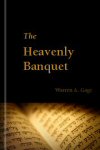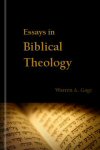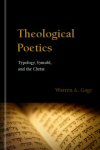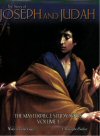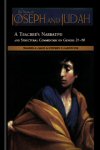By Warren A. Gage
The Heavenly Banquet provides a literary biblical theology of the New Testament in the form of an imagined dialogue in heaven. It is loosely conceived as a sequel to Bunyan’s Pilgrim’s Progress. In it, Christian enters the Celestial City and has a celebratory supper with the seven principal authors of the New Testament: Matthew, Mark, Luke, John, Paul, Apollos (Hebrews), and Peter. Each of them relates the argument of their individual theologies, focusing on the love of Jesus as they each uniquely understood it.
The Heavenly Banquet is part of Literary Biblical Theology Method, Typology, and Symbols Collection (3 vols.) and the Literary Biblical Theology Collection (11 vols.)
Buy
By Warren A. Gage
Essays in Biblical Theology explores the method set forth in Theological Poetics as developed through particular biblical characters. Following guidelines for a biblical, responsible method of typological interpretation of Scripture, this book examines the accounts of Moses, Joshua, David, Samson, and other biblical figures, showing how the depth and richness of these redemptive giants prefigure Christ, anticipating both his suffering and glory. Essays in Biblical Theology concludes with a pioneering study of the relationship between the narrative of Elijah typology and Mark’s Gospel—which unexpectedly provides an argument for the originality of the longer ending of Mark.
Essays in Biblical Theology is part of Literary Biblical Theology Method, Typology, and Symbols Collection (3 vols.) and the Literary Biblical Theology Collection (11 vols.)
Buy
By Warren A. Gage
According to the apostles, Christ fills and fulfills all things. Theological Poetics: Typology, Symbols, and the Christ, explores the biblical theology of the pleroma doctrine of the fullness of Christ. The approach of traditional biblical theologies generally has been historical in nature. This new approach focuses on the person and work of Christ, and demonstrates that all things in nature and Scripture—God and man, life and death, time and space, male and female, and more—find their fullness in him.
Theological Poetics: Typology, Symbols, and the Christ is part of Literary Biblical Theology Method, Typology, and Symbols Collection (3 vols.) and the Literary Biblical Theology Collection (11 vols.)
Buy
By Warren A. Gage, Christopher Barber
The Story of Joseph and Judah takes one of the most beautiful stories in all of Scripture and walks readers through an enhanced method of inductive Bible study. It shows the value of both scientific analysis and literary sensitivity in Bible study and introduces the student to chiastic structure and typological focus. The volume demonstrates that while the Joseph account is a wonderful story of a good and godly man, it is really an account of Judah’s redemption—the son of Jacob who was to receive the scepter in Israel. It demonstrates how the story is a foretelling of the Gospel of Jesus Christ. This volume is designed for individual or group study.
This book is part of the The Story of Joseph and Judah collection (2 vols.) and part of the Literary Biblical Theology Collection (11 vols.)
Buy
By Warren A. Gage, Steven P. Carpenter
This teaching supplement is designed for preachers and teachers as they unfold the Joseph and Judah narrative to congregations and Bible study groups. This volume supplements and enhances the background to Genesis 37–50. It takes readers on a deeper journey into the closing narrative of Genesis, exploring more thoroughly how each episode of Joseph and Judah’s story is artistically composed and pieced together in a story flow. Besides containing material that will enrich the use of The Story of Joseph and Judah in Bible study settings, it is written in a way that will allow pastors and teachers to use it directly for teaching on this important narrative.
This book is part of the The Artistry of the Joseph Narrative collection (2 vols.) and part of the Literary Biblical Theology Collection (11 vols.)
Buy
